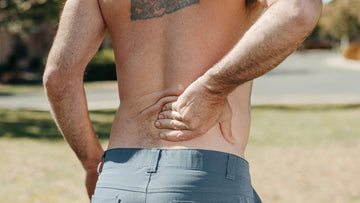It started with a twist, a cough, or maybe nothing at all
One moment you're reaching for the top shelf or laughing at a meme, and the next, you feel this sharp, breath-catching pain along your ribs. You pause, hold your side, and wonder: Did I just pull something in my chest? Yeah... that’s probably your intercostal muscles screaming at you.
Intercostal muscle strain can feel scary—like, Is this my heart? scary. But more often than not, it's a simple (and fixable) muscle issue that just needs the right kind of TLC.
In this guide, we’ll cover what your intercostal muscles actually do, what causes them to go rogue, how to treat a pulled rib muscle at home, and ways to prevent it from happening again.
Here’s what helped me—and might help you too.
Wait... what are intercostal muscles?
These are the small but mighty muscles that run between your ribs. You’ve got several layers of them, and they help your rib cage expand and contract when you breathe, twist, or move your torso.
When one of these muscles gets pulled or strained, you feel it. Breathing can hurt. Laughing feels dangerous. Rolling over in bed? Forget about it.
"I didn’t even know rib muscles could hurt this much. It felt like a deep bruise mixed with a cramp every time I moved." — Jasmin, Denver
What causes intercostal muscle strain?
Honestly, it doesn’t take much. Sometimes all it takes is a sudden twist, a heavy lift, or an intense sneeze.
Common culprits include:
-
Overstretching while reaching or exercising
-
Lifting heavy items without bracing your core
-
Poor posture over time (especially at a desk)
-
Coughing fits (hi, allergy season or chest colds)
-
Sports like tennis, golf, or swimming
And sometimes? You don’t even remember what caused it. Your body just says, nope.
"I thought it was a heart thing. Turns out? Just a pulled rib." — Jamie, Toronto
Symptoms to watch for
Intercostal muscle pain tends to be sharp, especially when you:
-
Breathe deeply or yawn
-
Cough or sneeze
-
Bend or twist your torso
-
Lie on the affected side
Other signs include:
-
Tenderness along the rib cage
-
Muscle tightness or spasms
-
Swelling or slight bruising (rare but possible)
If you feel chest pain with sweating, nausea, or radiating arm/jaw pain—please get medical help. It’s better to be safe.
Intercostal muscle strain treatment: what actually helps
Good news? Most intercostal muscle strains heal on their own with some simple care.
Start with rest
-
Avoid movements that trigger pain
-
Don’t power through workouts (tempting, but nope)
Cold + heat therapy
-
Ice during the first 48 hours to reduce swelling
-
Switch to heat (like a warm compress or heating pad) after to relax tight muscles
Gentle stretches
-
Side bends, cat-cow, and deep breathing can help
-
Slow is the name of the game
Pain relief
-
Over-the-counter meds like ibuprofen or acetaminophen
-
Topical creams can soothe the surface
Soft product tip: A warming roll-on muscle balm made my mornings less awful (and it weirdly helped me sleep).
Breathing exercises
-
Deep belly breaths reduce tightness and improve circulation
-
Try 5-minute breathwork before bed
Physical therapy (if pain lingers)
-
They can guide you through safe core exercises
-
Posture coaching can make a big difference
"Honestly? It helped faster than I expected. I started with gentle breathing and by week two, I was back to walking the dog without pain." — Lena, Austin
How to prevent a pulled rib muscle next time
Intercostal muscle pain loves to come back—unless you help your body move smarter. Here’s how:
Daily posture check
-
Shoulders back, core gently engaged
-
Take breaks from slouching at your desk
Warm up before movement
-
Especially before lifting, exercising, or chores
-
5-minute dynamic stretches go a long way
Breathe better
-
Shallow breathing keeps ribs stiff
-
Diaphragmatic breathing improves flexibility
Strengthen your core
-
Not just abs—think obliques, back, and even your diaphragm
-
Pilates and yoga are great for this
Tiny upgrade: A foam roller or stretch strap can help keep your upper body loose and aligned.
Real talk: recovery isn’t always linear
Some days you’ll feel almost normal. The next, it’ll flare up again. That’s okay.
Listen to your body. Move when it feels good, rest when it doesn’t. And don’t rush it.
FAQ: Pulled Rib Muscle Edition
How long does an intercostal muscle strain take to heal?
Most people feel better in 2 to 4 weeks. More severe strains may take up to 6 weeks.
Is it okay to exercise with an intercostal strain?
Light walking and gentle stretching? Yes. High-impact stuff or anything that twists your torso? Not yet.
Can I sleep on my side with this?
Try to avoid the painful side. Use extra pillows for support—it helps.
Do I need to see a doctor?
If pain lasts more than a week or worsens, or you’re not sure if it’s a muscle strain, get checked out. Better safe than googling at 2am.
Can a pulled rib muscle cause back pain?
Yep. The intercostal muscles wrap around, so tension can radiate into your back or even your sternum.
You don’t have to push through the pain
Living with intercostal muscle pain is frustrating. It messes with sleep, with breathing, with just existing.
But with the right care (and some patience), you can feel like yourself again.
If you’ve been powering through pain, maybe it’s time to let something simple support you.








